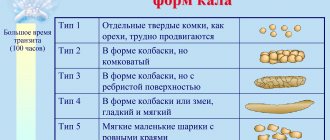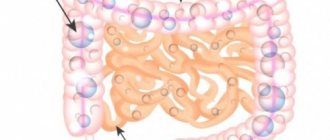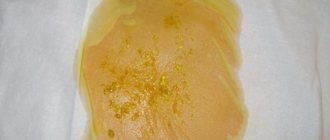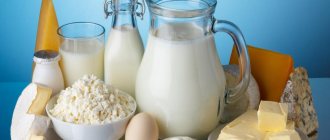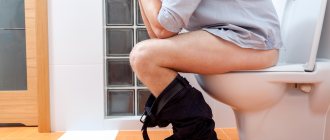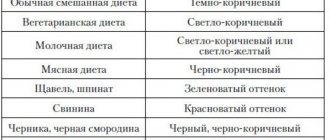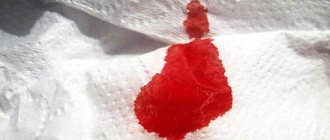Almost every person has experienced constipation at least once in their life.
Moreover, most people understand by this term the absence of daily bowel movements. This approach is not entirely correct: the normal frequency of stool in adults varies from 3 times a day to 3 times a week, and when making a diagnosis of constipation, other features of bowel movements are also taken into account. What is constipation really and can you cope with it yourself, at home?
Is this constipation?
Constipation or constipation is defined as defecation less than 3 times a week with difficulty passing dense stool. In diagnosing constipation, the nature of the stool and the patient’s accompanying complaints are important. Stool shape is determined using the Bristol scale. Constipation corresponds to types 1 and 2 of feces.
In 2021, the IV Rome criteria for constipation were formulated:
- less than 3 bowel movements in 7 days;
- hard stool;
- feeling of incomplete emptying of the rectum;
- feeling of an obstacle in the way of feces;
- the need for strong straining;
- the need for help with hands during defecation.
Constipation can be acute or chronic. An acute condition is characterized by the absence of stool for more than 48-72 hours. In the case of chronic constipation, difficulties with defecation are observed for 3 months or more.
Symptoms
There are two main manifestations of constipation - acute and chronic. The second form lasts from 2.5 months, intestinal function is disrupted, accompanied by pain and hard feces.
In addition, a round belly appears that cannot be pulled in. The acute form can be eliminated by proper nutrition, water, and stopping taking medications.
The main symptoms are:
- poor appetite;
- weakness;
- trembling in the limbs;
- nausea;
- fast fatiguability;
- poor skin condition, with rashes;
- accumulation of difficult to exhaust gases;
- high blood pressure;
- migraine.
All signs appear due to poisoning with toxic substances that cannot leave the body with feces. In the chronic form, the desire to perform an act of defecation comes rarely and does not last long. If you can’t visit the toilet at this time, the poisons will linger inside for another day.
False urges may be accompanied by the release of gases; the person gets relief for a while, as some of the stagnant air comes out, and the pressure in the intestines decreases. But new gases immediately form, and abdominal discomfort returns.
Gases pass through the stool, compressing it, causing pain. The symptom is clearly manifested in pea-sized feces .
If there are bloody spots, there can be two reasons - either anal and intestinal fissures, or internal bleeding. In the first case, the blood disappears after using medications - special suppositories, ointments. Bleeding in the gastrointestinal tract is accompanied by a dark color of the secreted plasma. If there is vomiting, acute abdominal pain, or increased body temperature, you need to call an ambulance
Main reasons for constipation
The causes of constipation are varied and often combined with each other.
- Anomalies in the development of the large intestine that create an obstacle to the path of feces: Hirschsprung's disease, Hilayditi syndrome, Payr's syndrome.
- Rectal pathology : prolapse, fissures, diverticula, hemorrhoids.
- Physical inactivity , causing slow bowel movements.
- Poor nutrition : lack of sufficient liquid, plant fiber in the diet, excess of meat dishes.
- Gastritis with high acidity.
- Functional motility disorders of the digestive tract - irritable bowel syndrome (IBS).
- Mechanical compression of the intestinal tube by a mass formation or adhesions.
- Systematic use of certain medications : calcium, iron, anticonvulsants, antihypertensive drugs, antidepressants.
- Contact with toxic substances , in particular heavy metals.
- Diseases of the nervous system : multiple sclerosis, parkinsonism, consequences of stroke, brain or spinal cord injuries.
- Pregnancy , during which mechanical compression of the intestinal loops by the enlarged uterus occurs. The situation is aggravated by hormonal changes in the body, which affect the peristalsis of the intestinal tube.
- Systemic diseases and metabolic pathologies : diabetes mellitus, systemic lupus erythematosus, amyloidosis.
- Changing your usual diet and lifestyle while traveling.
- Psycho-emotional instability : stressful situations, depression, obsessive states.
In some cases, it is not possible to establish the exact cause of difficult bowel movements, then they speak of idiopathic constipation.
Constipation in adults: causes and treatment
Most often, stool retention occurs after another untimely act of defecation. In everyday life it is called: “I endured it once and didn’t want to anymore.” Of course, there are a number of other reasons for this problem.
Primary constipation
Characterized by anomalies and malformations of the colon and its innervation. Most often, this pathology develops in childhood and in the early stages, with the help of surgical intervention, this problem is resolved.
Secondary or symptomatic
These are constipation due to diseases and damage to the layers of the colon: diverticula, anal fissures, ischemic colitis.
Secondary ones also include metabolic and endocrine disorders. In this case, metabolic disorders occur: hypothyroidism, diabetes.
Taking medications: anticonvulsants, opiates, iron supplements - this leads to the development of drug-induced constipation.
Chronic intoxication with heavy metals most often affects people who are in close contact with mercury and lead.
Gestational
Stool retention during pregnancy is associated with increased formation of progesterone in the blood, as well as mechanical compression of the colon by the uterus.
Nutritional-behavioral
According to statistics, this is the most common type of stool retention. They develop as a result of insufficient consumption of water and foods rich in fiber, as well as with excessive amounts of animal proteins consumed. As a result of improper eating behavior, extraintestinal loss of fluid occurs, with conscious suppression of the act of defecation, physical inactivity.
Mechanical
Problems with bowel movements resulting from narrowing of the intestine. This condition can be caused by compression of the intestine due to adhesions or tumor processes, or inflammation.
Idiopathic
Impaired motor function of the colon for unknown reasons. This diagnosis is made when all other pathologies have been excluded.
According to the duration of the disease, they are distinguished:
- Acute - absence of stool for several days. Most often, the causes of this pathology are: taking medications, intestinal obstruction, stress, climate change, prolonged stay in a horizontal position.
- Chronic - absence of regular bowel movements for months or more.
Today, there are various methods for identifying intestinal pathologies. After all, it is important for doctors not only to choose the right drug for constipation, but also to understand the very reason why this disease arose.
Mechanisms of development of constipation
There are 3 main mechanisms for the occurrence of constipation:
- A mechanical obstruction partially or completely blocks the intestinal lumen, and feces cannot move further to the anus.
- Motility disorder of the digestive tract. It may be too sluggish and ineffective, while feces remain in the large intestine for a long time and become more and more compact. Active, but uncoordinated peristalsis is also possible, in which the muscles of the intestinal wall contract randomly and cannot move the food bolus forward. Constipation also causes a prolonged spasm of a specific area of the colon.
- Disturbances from the anus are often associated with pain; the patient is unconsciously afraid of pain and prevents defecation. Psychogenic constipation, in which spasm of the anal sphincter occurs, is associated with a similar mechanism.
The selection of a treatment method should be carried out taking into account the leading mechanism of constipation.
Top 10 best laxatives for constipation
Duphalac syrup
It contains only one active substance - lactulose, which is diluted with specially purified water. Sold in the form of syrup in bottles of 200, 500 or 1000 ml with a special child-proof screw cap. The package also includes a measuring cup. On sale you can also find portioned packages designed for one-time use. These bags are made from aluminum foil. This medicine actively stimulates the activation of intestinal motility, accelerates the absorption of calcium salts and phosphates into the body. In addition, the effect of the drug has a positive effect on the metabolism of nitrogenous compounds in the body. Ammonia passes from the blood to the intestines, has a relaxing effect, and reduces the amount of nitrogen metabolic products formed there, toxic to humans. Lactuose, in turn, stimulates the active proliferation of lactobacilli in the intestinal environment. They reduce acidity in the lumen of the intestinal tube.
In combination, it is possible to achieve a decrease in osmotic pressure and increase the volume of intestinal contents, which is clearly noticeable in the change in the character of stool. Taken orally. All active compounds are not broken down by gastric juice and enter directly into the intestine itself. There are not too many contraindications, mainly they relate to individual intolerance to the active substance of the drug; it is also prohibited to take the syrup in case of suspected acute attack of appendicitis and diabetes mellitus. There are also side effects - these include electrolyte imbalance, which causes convulsions, arrhythmia, and may increase fatigue.
More: Top 10 most dangerous viral diseases in the world, coronavirus map
Advantages:
- A very effective, long-lasting remedy;
- Safe for pregnant and lactating women, as well as for small children - can be used literally from birth;
- Available in a variety of formats;
- The composition contains only one active ingredient, which is not broken down in the stomach.
Flaws:
- Quite expensive;
- You have to drink a decent amount at one time.
Duphalac syrup
Weakened tablets
This is a drug of synthetic nature, belonging to the group of laxative drugs. It is used in gastroenterology and proctology in order to quickly cope with difficult, delayed or insufficient bowel movements of various natures. Available in the form of tablets or drops. Taking the medicine can significantly improve the motility of the colon, which results in the laxative effect. The key substance here is sodium picosulfate; there are also a number of additional components - hydrochloric acid, sodium salt of methylparaben, sorbitol and distilled water (if you plan to use drops).
The tablets are film-coated and have a round shape for ease of swallowing. There can be 10 or 20 pieces in a package. The process of decomposition of the drug begins directly in the intestinal microflora. This is not to say that the medicine acts very quickly - the effect occurs in about 10-12 hours. The product allows you to accelerate the contraction of the walls of the colon, which also contributes to the rapid removal of waste from the body. There are few contraindications, but they exist - cystitis, bleeding in the gastrointestinal tract, peritonitis, and so on. Children can take drops starting at the age of 4, and tablets can be given to them at the age of 10. During pregnancy, it is allowed in the early stages - up to 12 weeks; the drug cannot be taken during breastfeeding. Side effects are minor - a slight decrease in blood pressure, weakness and mild nausea.
Advantages:
- Has a neutral taste;
- Reasonable cost;
- The laxative effect lasts for a long time.
Flaws:
- Not suitable for late pregnant women and young children;
- If you have abdominal pain, take with caution and under medical supervision.
Weakened tablets
Fitolax tablets
By and large, this is not so much a medicine as a dietary supplement, through which you can quickly normalize intestinal function. The drug quickly normalizes the intestinal microflora, which is what usually causes constipation. Experts recommend it to get rid of even chronic problems with bowel movements - you can take this remedy for a long time. The medicine is available in the form of chewable tablets with different flavors. It is made exclusively from natural raw materials, so there are not too many side effects, but you will still have to consult a specialist before taking it.
The active ingredients here are the following: senna leaf extract. With their help, it is possible to trigger peristaltic contractions of the intestines, which helps to quickly cleanse the body of waste. There is also plantain extract, which has an analgesic effect. Prunes soften the intestinal walls and restore microflora. Dill stabilizes the functioning of the gastrointestinal tract as a whole. Apricot extract contains many vitamins, minerals and microelements, which also have a positive effect on digestion. Begins to act after 8-10 hours.
Advantages:
- Includes only natural substances;
- Not only normalizes intestinal function and alleviates the patient’s condition, but also cleanses the body as a whole;
- It is quite gentle and there is no pain effect at all.
Flaws:
- Costs more than other laxatives;
- Not everyone likes the taste of such tablets.
Fitolax tablets
Bisacodyl tablets
The drug is able to cope even with constipation, which has already reached its most acute stage. In addition, it will be a good helper in the fight against intestinal weakness if a person has broken his bed rest or started eating improperly. It is often used in medicine to empty the bowel if required before surgery. It is found on sale not only in the form of tablets, but also in the format of suppositories and dragees. The optimal form is selected depending on the patient’s age, the presence of additional diseases and the required time for the beneficial effect to occur. The function of the main active ingredient here is performed by bisacodyl. A positive result is achieved due to an increase in the amount of mucus produced by the intestinal walls, as well as an increase in its peristalsis.
The substance stimulates nerve endings and, by and large, is a prodrug, since the therapeutic effect begins not after absorption, but as a result of hydrolysis of the active substance during metabolism. It should not be used with some foods and medications. This group includes dairy products, strengthening drugs, antacids, and so on. Some unpleasant moments may still arise - this includes colic, diarrhea or stomach pain (appears in case of an overdose), addiction is possible. The product should not be used for intestinal obstruction, hypersensitivity, various diseases of the abdominal cavity and hemorrhoids.
More: Top 10 best monthly contact lenses, how to choose good monthly lenses
Advantages:
- If the dosage is observed, an excellent result is ensured;
- Long shelf life of the drug;
- Acts very quickly;
- Reasonable price.
Flaws:
- There are plenty of contraindications and side effects.
Bisacodyl tablets
Fortrans powder
Designed exclusively for adult patients. The laxative effect is pronounced and manifests itself very quickly, so it should be used exclusively on the recommendation of a doctor with strict adherence to the requirements specified in the annotation for the drug. If you take it incorrectly or violate the dose, then problems with constipation can only get worse. The powder dissolves in water - the exact dosage is also given in the annotation; after dissolution, it should be drunk entirely. It is worth noting that the medicine is not able to cope with the cause of constipation, but it is quite capable of alleviating the condition of a sick person. The mechanism of action of the drug is relatively simple - it enters the digestive tract, where it attracts liquid and begins to retain it. As it sits in the stomach, the product swells, absorbing more and more moisture.
When it enters the intestines, the composition begins to saturate the waste with the collected moisture, loosens the excrement, covers the intestinal walls with a layer of moisture and stimulates them to subsequent contractions. The process of getting rid of waste occurs quite quickly and does not cause pain. It is worth noting that the product is quite aggressive, so it is not suitable for regular use, so it is prescribed exclusively for one-time use. If you use the powder frequently, the so-called lazy bowel syndrome may occur; due to the fact that the composition inhibits fluid, its regular use can lead to dehydration.
Advantages:
- Cleanses the intestines quickly and very effectively;
- Can be used on the eve of endoscopy or other surgical interventions;
- An original way to relieve constipation.
Flaws:
- Very unpleasant tasting product;
- Regular use is strictly prohibited;
- May cause vomiting.
Fortrans powder
Fitomucil norm powder
Another dietary supplement that can be used not only to treat constipation, but also to generally normalize stool. The composition is considered one of the safest on the market - it can be used not only by adults, but also by children aged three years and older. The composition here is exclusively natural, the body does not get used to it. Moreover, this laxative can be used during pregnancy and breastfeeding; it is also suitable for older people. The additive is produced in the form of a powder, which must be diluted in liquid. The basis here is the husk of plantain seeds, as well as an extract from dried plum fruits.
The first substance contains lignin, cellulose and hemicellulose. There is also soluble fiber here, which can absorb large amounts of moisture, increasing in volume. Plum includes pectins, a set of organic acids that help normalize metabolism and remove toxins and excess fluid from the body. Due to the use of such a drug, it is possible to increase intestinal motility, ensuring its natural emptying, and this occurs without bloating. When using the powder correctly, there are no side effects, and there are no contraindications. The only requirement from the manufacturer is not to take the medicine together with other drugs - it is better to wait one and a half to two hours.
Advantages:
- Excellent quality of the drug, providing a quick and long-lasting effect;
- Allowed for use by children, pregnant and lactating women;
- There are modifications for patients with lipid metabolism disorders.
Flaws:
- High price.
Fitomucil norm powder
Exportal powder
This is a fairly laxative of the latest generation, developed by domestic pharmacologists and characterized by high efficiency. It is absolutely safe to use. The main component used here is lactitol, a compound obtained from milk sugar. It is made in the form of a powder that can be diluted in almost any liquid - milk, water, tea, juice. There are several forms of release - there are sachets of 10 g (for adults) and 5 g (for children), and the laxative is packaged in plastic jars of 200 or 500 g. The latter options will be very convenient for people who have long suffered from chronic constipation. The product is easy to use - two sachets dissolve in liquid and are taken with meals.
The medicine, as mentioned earlier, is absolutely safe, non-addictive, so it can be used for a long time - for up to 5 months. It is also used if it is necessary to completely cleanse the intestines before surgery or radiographic examination. Lactitol affects the acid-base environment of the intestines, which can negatively affect the use of other medications, so it is advisable to separate the intake of laxatives and other medications at least two hours apart.
Advantages:
- Good efficiency;
- There is no addiction;
- Promotes the active development of beneficial microflora;
- Does not increase blood glucose levels;
- Does not cause irritation of the gastrointestinal tract.
Flaws:
- During the first few days, mild flatulence may occur.
Exportal powder
Guttalax tablets
Another new drug, but it was already developed by German pharmacologists. It can be purchased without a doctor's prescription, and it belongs to the middle price range. Guttalax belongs to the group of stimulating laxatives. The active compound here is sodium picosulfate, which actively affects the mucous membranes and walls of the colon. On sale you can find not only tablets, but also drops for oral administration. The latter are allowed to be used by children aged four years and older. It is more convenient for adult patients to take tablets, but drops are quite suitable for them - 20 drops for a mature person will be quite enough. The drug is well suited for people who suffer from chronic constipation.
More: Top 10 best anti-snoring remedies
The time for the positive effect to occur is from 6 to 12 hours, depending on the body’s metabolic rate. During pregnancy, it is quite acceptable to use this remedy, but this should be done under the close supervision of a specialist. During feeding, the drug is absolutely safe for the baby, as it does not pass into breast milk. The drug allows you to cope with situational constipation, which is associated with a violation of the diet, a small amount of water consumed, or the use of other medications, where constipation acts as a side effect. It is allowed to use this composition even if you have gallbladder diseases. The product itself has virtually no side effects - increased gas formation, mild cramps and nausea may occur.
Advantages:
- Has a fairly mild effect;
- Interacts well with other medications;
- The drops are placed in an easy-to-use plastic bottle.
Flaws:
- The price is a bit high.
Guttalax tablets
Microlax microenema
A quickly effective remedy that has a very fast effect - from 5 minutes to half an hour. No other medicine in our review acts more actively on the intestines. Another undeniable positive point associated with this microenema is the ability to use it even for newborn children. The product is packaged in small enemas made on the basis of soft silicone. They are disposable, which ensures hygiene, increases the speed of action, and is quite convenient to use. Each of them contains the required dose of laxative. The microenema does not require preliminary antiseptic treatment and is ready for introduction into the body immediately after removal from the package. It quickly softens waste and facilitates its elimination, so there is no unpleasant or even painful sensation during bowel movements.
It is allowed to use this medicine even during pregnancy and breastfeeding. The drug does not pass into the gastrointestinal tract beyond the resulting congestion. The composition contains sodium citrate, sodium lauryl sulfoacetate and an aqueous solution of sorbitol. Their active action is aimed at providing a good laxative effect and mildly combating constipation.
Advantages:
- High efficiency and good speed of action on constipation;
- There are no unpleasant sensations during use;
- The product does not require preliminary preparation;
- Can be used by pregnant and lactating women, as well as children from birth.
Flaws:
- Very high cost;
- It is not advisable to use it on an ongoing basis.
Microlax microenema
Lavacol powder
Here is the leader of our review of the best remedies for constipation - this is also a Russian-made drug, characterized by a mild and very pleasant taste. The effect is not too strong, but quite long lasting. It is worth noting that this laxative can only be purchased with a prescription from a specialist, so it will not be possible to do without his consultation. Take the product exclusively on an empty stomach, after dissolving it in a glass of clean water at room temperature. The effect should be expected approximately 10-12 hours after use. In principle, sweet syrups or jams can be added to the suspension, making its taste even more pleasant.
The active ingredients here are the following: macrogol, polyethylene glycol, sodium bicarbonate, anhydrous sodium sulfate, potassium and sodium chlorides. The function of the most active component is performed by macrogol - it is with its help that a pronounced laxative effect can be achieved. In addition, this substance does not allow the absorption of water in the intestines, which makes it easier to clear it of all contents. It was not possible to do without some contraindications - worsened intestinal permeability, impaired kidney function, various inflammatory processes in the gastrointestinal tract.
Advantages:
- Fairly reasonable cost;
- There is no unpleasant taste;
- Good and long lasting effect;
- There are no unpleasant or painful sensations.
Flaws:
- It was not possible to do without contraindications;
- It doesn't start working right away.
Lavacol powder
Possible complications
If you do not tackle the problem of constipation in a timely manner, the risk of complications increases:
- the appearance of anal fissures - painful ruptures in the anal mucosa;
- the occurrence or exacerbation of hemorrhoids, bleeding from hemorrhoids;
- development of intestinal obstruction due to fecal impaction;
- prolapse of the rectum - protrusion of its inner membrane due to strong straining;
- acute vascular disorders due to intense muscle tension (hypertensive crisis, stroke).
So you don't need to push too hard. If all else fails, you should first use one of the laxatives. Under its influence, defecation will be faster and easier.
Attention! Some of the complications require emergency medical attention. If there is heavy bleeding from the rectum or loss of consciousness during straining, you should urgently call an ambulance.
Treatment and prevention
Preventive measures will help reduce the risk of hard feces if the problem is not caused by pathological diseases. This requires walks in the fresh air for 40-50 minutes every evening, separate meals, exclusion of fatty, fried foods, marinades and preserves.
The consumption of pure still water should be increased to 2-2.5 liters per day, mainly in the first half of the day (this will prevent swelling). At the first sign of constipation, real action will help eliminate the cause within 1-2 weeks.
When nutrition does not help establish hard stools, medical help is required. They do not recommend self-medication or abusing laxatives without prescription.
Diagnostic methods
At the appointment, the doctor first of all clarifies the nature of constipation and clarifies the presence of accompanying complaints: abdominal pain, flatulence, nausea, bleeding from the rectum. Then he asks about the course of the disease, the presence of concomitant diseases, and conducts a general examination and palpation of the anterior abdominal wall.
First of all, a standard set of examinations is prescribed: a general blood and urine test, a biochemical blood test, and a stool test. Additional diagnostic techniques are also needed:
- X-ray of the intestine with contrast - irrigoscopy;
- colonoscopy with collection of biopsy material;
- Ultrasound, MSCT of the abdominal organs;
- anorectal manometry – determination of the tone of the anal sphincter;
- electromyography – assessment of the contractility of the muscles of the abdominal wall and pelvic floor.
In cases where the listed examinations do not reveal pathology, it is worth thinking about psychogenic constipation. If it is excluded, idiopathic constipation is diagnosed.
Drug treatment
All drug treatment comes down to:
- Replacing medications that cause constipation (if a person uses something to treat other ailments).
- Prescription of mild laxatives – Mucofalk, Methylcellulose, etc.
- Use of medications with an osmotic effect: Sorbitol, Duphalac (not prescribed for gastrointestinal diseases).
- Purpose of glycerin and vaseline lubricants.
- Physiotherapy.
- Taking vitamins B1, ascorbic acid, retinol.
Physiotherapy is prescribed in cases where drug treatment does not help or in combination with therapy for the underlying disease. Paraffin and mud applications are used on the lower abdomen, electrophoresis, ultrasound using a special technique, ascending shower, ultraviolet radiation, faradization.
Treatment options
Constipation does not always require medication correction. Sometimes it is enough to change your lifestyle, diet, or stop medications that cause stool retention.
Diet and lifestyle
To avoid delayed bowel movements, make sure your diet includes fresh fruits and vegetables as a source of fiber. Nuts, unprocessed bran, whole grain wheat, and fermented milk products are also useful. Avoid eating large amounts of meat, cheese, eggs, chocolate, strong tea and coffee, rice, semolina.
Try to drink more liquid - 1.5-2 liters per day. This is especially important in hot weather, with profuse sweating. It is better to drink non-carbonated water, fruit and berry juices, fruit drinks, compotes. Eat regularly, 4-5 times a day.
To successfully combat constipation, sometimes you have to change your lifestyle. You need to move more and do physical exercise. You should not suppress the urge to defecate, but you should not linger in the toilet for a long time. It is optimal to accustom the body to bowel movements in the morning, after breakfast.
Folk remedies
The most popular among traditional methods of treating constipation is the use of various oils. Usually, to relieve constipation, it is advised to drink a tablespoon of olive, flaxseed, castor oil or eat a piece of butter.
Flax seeds prepared in the form of jelly are also effective. Herbal remedies based on senna, marshmallow, plantain, rhubarb, chamomile, and aloe are also beneficial.
Prunes in the form of whole berries or compote are considered a tasty and healthy cure for constipation. Honey, carrot and beet juice help a lot, especially if consumed regularly.
For more information about folk recipes for treating constipation, watch the video with Dr. Evdokimenko.
Drug therapy
Laxatives are selected depending on the mechanism of constipation. It is not recommended to drink them yourself.
- Osmotic laxatives based on lactulose (Duphalac, Forlax) increase the amount of fluid in the colon, making stool easier to pass. These drugs increase peristalsis and provoke abdominal pain, so their dose must be increased gradually.
- Saline laxatives (magnesium sulfate, Glauber's salt) act similarly, but faster in time.
- Laxatives that increase the volume of stool (mucofalk) have a similar mechanism of action. However, they not only retain water, but also lubricate the colon mucosa, which facilitates the passage of feces.
- Irritating agents (senade, bisacodyl) stimulate peristalsis and help quickly eliminate constipation. However, over time, addiction develops to them and an increase in the dose of the drug is required.
- Softening laxatives are represented by rectal suppositories and enemas (Glycelax, Microlax). Most often, these drugs are used during pregnancy, since they have minimal systemic effect, during prolonged bed rest and in the postoperative period after interventions in the anorectal area.
- Antispasmodics (papaverine, duspataline) are used to treat patients with spastic constipation.
- Prokinetics (resolor, trimedate) are effective in cases of decreased intestinal tone.
Laxatives are contraindicated in acute inflammatory processes in the digestive tract, uterine bleeding, high fever, and mechanical obstructions in the intestines.
Diet for constipation
Dietary nutrition involves consuming foods that contain large amounts of fiber and enhance intestinal motility. Sour milk, wholemeal bread, fruit juices, dried fruits, vegetable oil drunk on an empty stomach will speed up bowel movements. You can improve intestinal motility by drinking cold liquid, so it is recommended to add cold first courses to your diet, and drink a glass of cold juice or water in the morning.
Nutrition for constipation in adults
You need to eat in small portions, but every 4 hours. This will help food digest better, which means you will be able to avoid increased gas formation.
Foods containing dietary fiber will help improve bowel function during constipation. These are all vegetables and fruits, cereals, nuts, seeds. Salads made from carrots, beets, cucumbers, tomatoes, cabbage, seasoned with vegetable oil are healthy.
Pumpkin, plums, apples, peaches weaken. Fermented milk products (kefir, fermented baked milk, yogurt, cottage cheese, buttermilk, yogurt) are beneficial for the intestines, as they help normalize the composition of the microflora. To improve bowel movements during constipation, you need to eat cereals daily. It is better to cook porridge from buckwheat, oatmeal, millet or corn groats.
It is necessary not only to add laxative foods to the diet, but also to avoid foods that have a strengthening effect or cause increased gas formation. You should avoid rice, jelly, potatoes, legumes, black or fresh bread, whole milk, fried, hot and spicy foods. Drinking enough fluids will help improve bowel function during constipation.
A person should consume approximately 30 ml of liquid per kilogram of weight per day. Not only clean drinking water is considered, but also compotes, juices, and broths. If there is not enough fluid in the large intestine, the feces quickly become dehydrated, they become hard and dry, making their evacuation difficult.
Lack of water in an adult can lead to the formation of fecal stones, when dry feces are layered onto the core (an undigested piece of food, a foreign body) and partially block the intestinal lumen. You can restore intestinal function using the advice of traditional medicine. To cleanse the intestines and facilitate bowel movements, senna, flax, buckthorn, rose hips, rhubarb, and zoster are used.
To normalize stool, food is prescribed that corresponds to treatment table No. 3
If the feces are hard and difficult to pass, then to soften them it is recommended to make a decoction of dandelion, nettle, flaxseed or borage. Flax or white plantain seeds swell in the intestines, which enhances peristalsis and promotes the movement of feces.
The seeds of dill, cumin, and fennel have a carminative effect, so they are recommended for use in case of increased gas formation. Plant materials can be purchased at a pharmacy or collected yourself.
It is necessary to select a diet for difficulties with bowel movements together with a specialist, since it may have its own characteristics depending on the diagnosis. For example, for dyskinetic constipation with hypermotility, a diet is prescribed that contains a sufficient amount of animal fats, and fiber is introduced gradually, starting with more tender ones.
General recommendations for combating constipation
It is very important to form the right lifestyle, daily routine and psychological attitude. To do this, you should follow several rules:
- You cannot tolerate the urge to go to the toilet and restrain this urge. With repeated delayed responses to body signals, they subsequently weaken and disappear completely.
- You cannot be distracted by reading or other activities when visiting the toilet.
- You should try to go to the toilet at the same time.
- If you need to push, it is better to do it while sitting up straight, with your feet on the floor.
- It is important to learn to relax in any life situations, avoid stressful moments, and look at everything with a smile.
Type of constipation
Constipation is divided into several subtypes:
Each subtype is further divided into several more types, which differ in the method of appearance and characteristic features: mechanical, nutritional, medicinal and neurogenic.
Atonic constipation occurs due to problems with peristalsis. Normally, stool moves through the intestines quickly, but in this situation it moves slowly. The stool becomes denser and more voluminous, the stomach begins to distend strongly, and severe pain is felt during bowel movements. Due to the hard masses, cracks in the anus and bleeding may occur.
Folk remedies
To cope with hard feces, you can turn to traditional medicine.
Herbalists advise paying attention to the following recipes:
- Brew a teaspoon of flax seeds in 100 ml of boiling water, leave for 20 minutes. Cool and drink in the morning on an empty stomach.
- Take a tablespoon of bran every morning.
- Squeeze the juice from the beets, let it brew for an hour and take a glass throughout the day. You can use carrots instead of this vegetable.
- The brine from pickled cucumbers or cabbage perfectly removes toxins and improves bowel movements, so it is recommended to drink 100 ml 2 times a day between meals.
- You need to take 1 tablespoon of corn oil daily before breakfast.
You cannot do an enema with soapy water. It will empty the colon quickly, but will cause irritation if there is internal damage. The method is considered radical and ineffective for chronic constipation.

